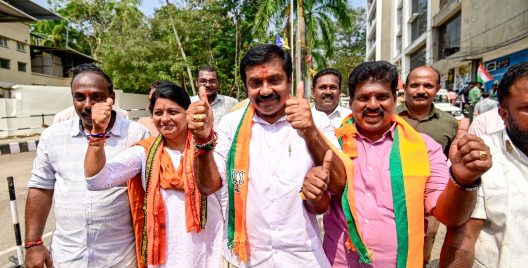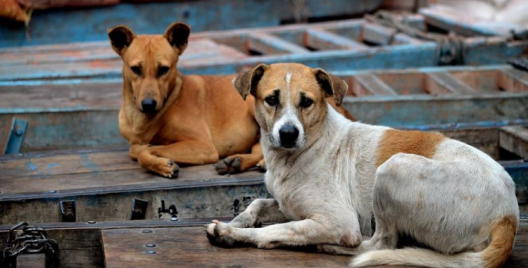The certification of the upcoming Malayalam film JSK: Janaki vs State of Kerala has reportedly been delayed due to informal objections raised over the protagonist’s name Janaki, which, producers say, was deemed inappropriate by some because it is associated with the Hindu goddess Sita.
The film, starring BJP Union Minister of State Suresh Gopi in a lead role, is scheduled for worldwide release on June 27, 2025. With only two days to go, the production house, Cosmos Entertainment, approached the Kerala High Court on Wednesday, June 25, seeking urgent directions to the Central Board of Film Certification (CBFC) to issue clearance without further delay.
According to Live Law, the petitioner informed the court that the film had been submitted through the CBFC’s e-cinemapramaan portal on June 12, and the censor screening was completed by June 18. No formal objections have been communicated to date, the producers said, yet the certification process remains stalled.
The production company has argued that such objections have no legal standing, and that the continued delay in certification, without official explanation, violates the board’s procedural norms. The court is now expected to decide whether the film can proceed with its scheduled release later this week.
The argument, though not the primary legal concern in the case, reveals an unsettling sentiment: that a survivor of sexual violence “sullies” a name associated with religious reverence. That her trauma somehow makes her unworthy of sharing that name.
It’s a belief steeped in centuries of patriarchal dogma: the idea that women’s worth is tied to purity, and that sexual violence leaves not the perpetrator, but the survivor, tainted.
This moment deserves attention not because it is legally binding (the court did not issue an order mandating the name change) but because it shows how deep these social fault lines run, even in spaces that are meant to uphold justice.
The problem isn’t the name, it’s the stigma
Indian law rightly mandates the anonymity of sexual assault survivors (Section 228A of the Indian Penal Code). But anonymity is not the same as erasure. Protecting a survivor’s identity does not require replacing it with a name that is sanitized for the comfort of others. Choosing Janaki as a pseudonym should be unremarkable. That it has become controversial is what demands scrutiny.
What we are seeing here is not the safeguarding of survivor dignity, but the preservation of religious sentiment, at the survivor’s expense. This inversion of priorities is dangerous. It signals that collective notions of “sacredness” override the lived trauma of real people.
Worse, it implies that the survivor, by virtue of her abuse, is now too “impure” to carry the name of a goddess. The name becomes sacred. The girl becomes disposable.
Purity politics in popular culture
This isn’t a one-off event. The politics of naming, especially through a religious lense, is playing out across cultural mediums, especially in cinema, in ways that mirror and reinforce these regressive ideas.
In the 2024 Tamil film Token No., the protagonist’s name was originally Janaki, until the filmmakers decided to rename her Jayanthi in post-production. Why? Because her character was in a romantic relationship with a man named Abraham. The idea that Janaki, a quintessentially “Hindu” name, should not be associated with interfaith romance is a subtle but telling act of cultural gatekeeping.
Similarly, in Imaikkaa Nodigal, the antagonist is named Martin Roy, a name coded as Christian. In Psycho (2020), the serial killer is shown to have studied in a convent. These may seem like isolated creative choices, but together they reflect a pattern: Christian or Muslim identifiers are disproportionately used for morally ambiguous or villainous characters, while Hindu names are protected, idealized, and kept above narrative contamination.
Such portrayals reinforce the notion that virtue and morality are the domain of one religion, while deviation and danger belong to others. It is a form of communal subtext that subtly indoctrinates viewers over time.
In this ecosystem, a name like Janaki must remain pristine, untouched by desire, defilement, or deviation. Even in fiction, the name cannot fall in love across faiths. Even in a court pseudonym, it cannot be linked to a survivor of violence. This is not artistic discretion. It is systemic sanitization.
The Real Violence is Erasure
At the core of all this lies the same impulse: to treat survivors as symbols of shame rather than as people. To remove their names from public view, not to protect them, but to protect cultural pride.
It is an impulse that masquerades as reverence, but it is rooted in fear: the fear that trauma, impurity, or interfaith relationships somehow taint our carefully constructed identities.
But the idea that survivors should give up their names, their stories, or their humanity to preserve societal sanctity is both ethically and constitutionally indefensible. It reinforces what feminists have long critiqued: that women’s bodies are treated as vessels of honor, and that violence against them is seen not as a crime against the individual, but as a stain on the collective.
The onus then falls absurdly on the survivor, to be silent, invisible and even renamed.
A broader crisis of pluralism
What’s playing out in this moment is not only about gender or cinema. It is also about India’s eroding comfort with religious plurality and individual freedom.
When Hindu names must be protected at all costs, while Christian or Muslim names are typecast as villainous, the issue is not merely creative or cultural. It’s political. It’s about what kind of nation we want to be, one where all identities are treated with equal dignity, or one where names are policed to fit a dominant narrative.
The court did not mandate the name change, but the fact that such an objection was even raised, and considered, signals a dangerous drift. It shows that even the judicial imagination is not immune to purity politics.
What justice actually looks like
Justice, in its truest sense, should prioritize the person over the symbol. It should care less about preserving the “honour” of a name and more about the rights, autonomy, and healing of the person who bears it.
If we are truly committed to a just and plural society, then we must challenge the idea that names, or women, need to be sanitized to be acceptable.
Let Janaki remain Janaki. Not because her name deserves protection, but because she does. Because what happened to her should not diminish her, and it should not give anyone else the right to rewrite her identity.
Let us protect survivors, not symbols. Let us value justice, not discomfort. And let us stop pretending that trauma makes people unworthy of their own names.
A name is not a stain. But silence is.













